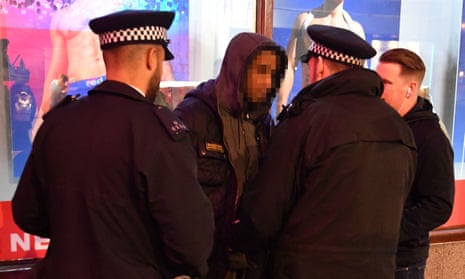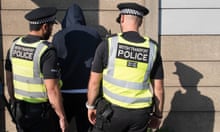Black people in England and Wales are 40 times more likely than white people to be stopped and searched under controversial powers that home secretary Sajid Javid recently made it easier for officers to use.
The analysis is based on Home Office internal data, which means Javid is likely to have known of the discriminatory impact when he gave the police greater powers last month to use “section 60” checks. The power allows officers to search anyone in a defined area for a limited period if serious violence is anticipated.
Last week, Cressida Dick, head of the Metropolitan police, launched a defence of stop and search, arguing it had reduced the murder rate in the capital by a quarter over the past year.
But campaigners insist the power is “doing untold damage to communities’ trust”, because the rate at which prohibited items are found is broadly even across all ethnicities. Rosalind Comyn, policy and campaigns officer at the civil rights charity Liberty, which analysed the data, said: “These statistics reveal that race disproportionality in the use of suspicion-less section 60 powers is rising at a staggering rate – statistics the government held when they decided to relax restrictions on when police can use these powers.”
In the year to March 2018, black people in England and Wales excluding London were 26 times more likely to be stopped, but in the previous 12 months they were just six times more likely to be stopped. In London, black people were 12 times more likely to be stopped, compared with four times the previous year. Combined figures for England and Wales show black people were 40 times more likely to be stopped, up from 14 times in 2017.
Separate London figures reveal that this March, a black person was 12 times more likely than a white person to face a “more thorough” search. The searches, which require the removal of more than outer clothing, were conducted 400 times on a black person compared with 152 times on a white person, which when the ethnic make up of the city is calculated, means a black person was 11.8 times more likely to be targeted.
In 2014, the then home secretary Theresa May discouraged the practice, calling it “unfair, especially to young black men”.
Comyn said: “Empowering police to stop and search without suspicion is a recipe for discrimination, doing untold damage to communities’ trust that they will be fairly policed. It is the antithesis of properly targeted and accountable stop and search – arrest levels under section 60 are minimal. By expanding section 60 powers, the Home Office displayed an alarming willingness to ignore evidence and embrace dangerous quick fixes in pursuit of eye-catching action on knife crime.”
Dick briefed the media on how increasing stop and searches had helped deliver a 15% drop in the number of under-25s being stabbed in London.
The force recorded 181,873 stops during the year to April 2019, compared with 132,127 in the previous year – an almost 40% rise. The data shows a steady increase in the power’s use, with the last month for which year data is available, March 2019, the highest for years, with 26,818 uses. Dick’s defence of the tactic has prompted campaigners to claim that the measure has been rolled out in stealth and alienates communities that officers rely on for intelligence.
A Home Office spokesperson said: “Stop and search is a vital police tool when used in a targeted and fair way. We are clear that nobody should be stopped based on their race or ethnicity, and forces must ensure that officers use these intrusive powers in a way that is fair, lawful and effective. Low numbers of searches under section 60 mean inferring figures of racial disparities from this small subsection would be misleading.”
The Home Office report states that police in England and Wales carried out 2,501 section 60 stop and searches during the year to March 2018, four times the number in 2017.








